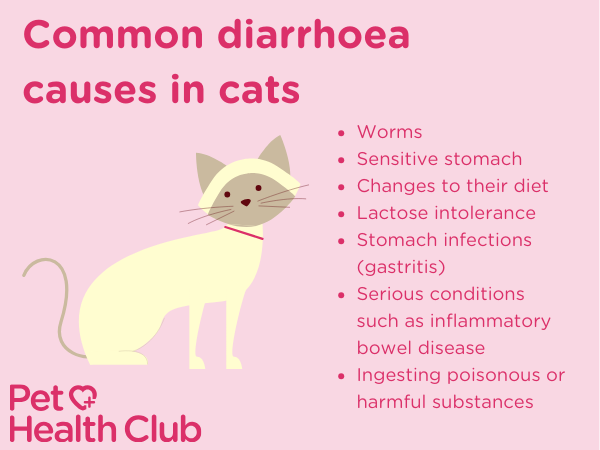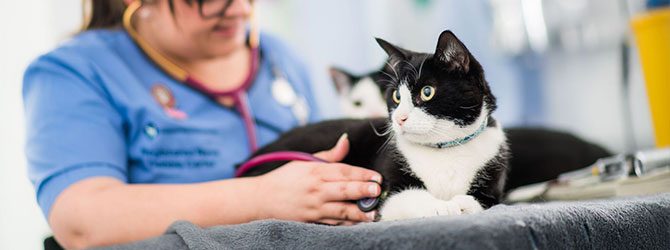Why does my cat have diarrhoea? Causes of diarrhoea in cats
We all know how rubbish we feel after a bout of diarrhoea and vomiting – and no one likes to imagine their cat suffering in the same way. Cat poo, poop or faeces – there are lots of names for it, but if your cat is experiencing an episode of runny or continuous diarrhoea, you may need to take action.
While a one-off bout of diarrhoea may simply be a sign that your cat has eaten something that hasn't been agreeable to them—adventurous outdoor cats often have a particularly 'experimental' diet—there are many possible causes of diarrhoea in cats.
Cat diarrhoea is a good reason to visit your vet, who will help to establish the cause and recommend treatment, if necessary. Always book an appointment immediately if the diarrhoea is chronic, contains blood, if your cat is showing other signs such as vomiting, or if you suspect your cat has come into contact with a toxic or harmful substance.
Diarrhoea in cats: the warning signs
If your cat has a one-off bout of diarrhoea but is otherwise alert, active, eating normally and showing no other symptoms, it's probably no cause for alarm.
If your cat is lethargic, has had diarrhoea for over 24 hours, is vomiting, has lost their appetite, or displays any other symptoms, don't delay – get them to your local vet. Prolonged diarrhoea can quickly cause your cat to become dehydrated, so it's important to be vigilant.
Common causes of cat diarrhoea

Worms
Worms are a common nuisance in the cat world, leading to various health issues, including diarrhoea. Cats can pick up worms in several ways, such as ingesting infected prey (like rodents), coming into contact with contaminated faeces, or, for kittens, via their mother.
The main parasites are roundworms, tapeworms, and lungworms. These parasites live in the cat's intestines, causing reduced absorption of nutrients, irritation to the gut, and sometimes diarrhoea. Other symptoms might include visible worms in faeces or vomit, weight loss despite a good appetite, and a dull coat.
Regular deworming, based on a schedule recommended by your vet, is crucial in managing this issue.
Sensitive stomach
Some cats have sensitive stomachs, reacting negatively to certain ingredients in their food or changes in their diet. The cause might be an intolerance to specific food components (like certain proteins or carbohydrates) or additives.
This sensitivity can lead to diarrhoea, vomiting, and general gastrointestinal discomfort. Food allergies can also present with dermatological symptoms such as itching and hair loss. Managing a sensitive stomach often involves feeding easily digestible, high-quality cat food with limited ingredients to identify and avoid what's causing the issue.
Changes to their diet
Cats are creatures of habit, and this extends to their diet. Abrupt changes in their food can upset their digestive system, leading to diarrhoea. The digestive enzymes and bacteria in their gut are adapted to a specific type of food, and a sudden switch can disrupt this delicate balance.
To avoid this, any diet change should be gradual, mixing the new food with the old in increasing proportions over a week or more. This slow transition helps the cat's digestive system adjust without causing upset.
Lactose intolerance
Despite the popular image of cats happily lapping up a saucer of milk, many adult cats are lactose intolerant. Their digestive systems can't break down lactose, a sugar found in milk, leading to diarrhoea if they ingest milk or other dairy products.
This intolerance can vary between individuals, but avoiding giving your cat milk or dairy products is generally a good idea. Lactose-free cat milk products are safer options to give your cat a milk-like treat, although these can be highly calorific.
Stomach infections (gastritis)
Gastritis, or stomach lining inflammation, can be caused by infections from bacteria, viruses, or even ingesting bad food. Symptoms include vomiting, diarrhoea, dehydration, and lethargy.
Cats can contract these infections from various sources, including contaminated food, water, or contact with other infected animals. Treatment for gastritis may include antibiotics for bacterial infections, dietary management, and supportive care to maintain hydration and nutrition.
Inflammatory bowel disease
Inflammatory Bowel Disease (IBD) in cats is a chronic gastrointestinal disorder that thickens the intestines due to an infiltration of inflammatory cells. This condition disrupts normal food absorption and passage through the intestines.
The exact cause of IBD is unknown but is thought to involve genetic factors, an abnormal immune response, and possibly diet.
Symptoms include chronic diarrhoea, often with weight loss and vomiting.
Diagnosing IBD can require a combination of blood tests, faecal tests, imaging (like X-rays or ultrasound), and sometimes a biopsy of the intestinal lining.
Treatment typically involves dietary management (often with hypoallergenic or easily digestible foods), medications to reduce inflammation and suppress the immune system, and sometimes supplements like probiotics.
Ingesting poisonous or harmful substances
Cats are curious creatures and sometimes eat things they shouldn't, like chemicals or toxic plants. This can cause a range of symptoms, including diarrhoea.
Contact your vet immediately if you suspect your cat has ingested something harmful. Keeping dangerous substances out of reach and knowing which plants are toxic to cats can help prevent these incidents.
How do I stop my cat getting diarrhoea?
Preventing cat diarrhoea involves attentive care, dietary management, and environmental control. Here are some steps you can take to help keep your cat's digestive system running smoothly and reduce the chances of diarrhoea.
High-quality diet
Stick to a high-quality diet suited to your cat's age, health status, and lifestyle. Cats need a diet high in protein and low in carbohydrates.
Limit treats and avoid giving your cat human food, especially foods toxic to cats or likely to cause stomach upset, such as dairy products, onions, garlic, chocolate, and anything containing caffeine.
Keep up with preventative care
Regular vet check-ups are essential for maintaining your cat's overall health and catching any potential issues early before they lead to diarrhoea. These can be done whilst you have your cat vaccinated or when they are getting their boosters. Keeping them vaccinated will stop dangerous diseases and help keep your cat healthy.
Regular parasite prevention is crucial, even for indoor cats, as parasites commonly cause diarrhoea.
Keep toxins out of reach
Keep toxic substances out of reach. This includes household cleaners, certain plants, human medications, and foods unsafe for cats.
Be mindful of small objects your cat might ingest, which can lead to gastrointestinal obstruction and diarrhoea. Cats are curious and may eat things they shouldn't, like string, rubber bands, or small toys.
Provide clean, fresh water
Ensure your cat has access to clean, fresh water at all times. Proper hydration is essential for digestive health and can help prevent diarrhoea.
Manage stress
Cats are sensitive to environmental changes; stress can disrupt their digestive system. Provide a stable environment, regular play and interaction, and safe, quiet spaces for your cat to retreat.
Offer environmental enrichment like toys, scratching posts, and cat trees to stimulate your cat physically and mentally.
Monitor them closely
Keep an eye on your cat's stool consistency and frequency. Changes can be an early sign of health issues. Watch for signs of illness, such as lethargy, vomiting, loss of appetite, or changes in water consumption, and consult your vet if you notice anything concerning.
Keep their litter box clean
Keep the litter box clean and scoop it at least once a day. Regular cleaning can help you monitor your cat's bowel movements for any signs of trouble, encourage your cat to use the box, and maintain good toilet habits.
Treating diarrhoea in cats at home
If your cat has a minor bout of diarrhoea, you may be able to manage it at home. Offer plenty of water and small, frequent meals. It is no longer recommended to starve a cat with diarrhoea. Small portions (around a handful) of bland food such as plain chicken, white fish, or scrambled eggs can help tempt your cat to eat and relieve the diarrhoea.
Contact your vet if your cat doesn't improve in 24-48 hours or shows other signs such as vomiting, lethargy, or not eating.
Veterinary treatment for feline diarrhoea
When you take your cat to the vet for diarrhoea, the vet's approach to treatment will depend on the underlying cause, the severity of the symptoms, and your cat's overall health.
Initial assessment
The vet will start with a thorough history and physical examination. They'll ask about the duration and severity of diarrhoea, any changes in diet or behaviour, and any other symptoms you've noticed.
The physical exam will check for dehydration, abdominal pain, and any signs of underlying health issues.
Diagnostic tests
To determine the cause of the diarrhoea, the vet may recommend several tests, including:
- Faecal examination: To check for parasites or bacterial infections.
- Blood tests: To assess overall health, organ function and look for signs of infection, inflammation, or anaemia.
- Urinalysis: To evaluate kidney function and hydration status.
- X-rays or ultrasounds: To look for blockages, tumours, or other abnormalities in the digestive tract.
Treatment
Treatment will vary based on the diagnosis but may include:
Dietary management
Your vet might recommend a temporary switch to a bland or prescription diet that is easier for your cat to digest. A longer-term diet change may be necessary for food intolerance or allergy.
Fluid therapy
If your cat is dehydrated, they may need subcutaneous (under the skin) or intravenous (IV) fluids to restore hydration and electrolyte balance.
Medications
Depending on the cause of the diarrhoea, medications could include:
- Antiparasitics to treat worm or protozoal infections.
- Antibiotics if a bacterial infection is suspected.
- Probiotics to help restore healthy gut flora.
- Anti-inflammatory drugs for conditions like inflammatory bowel disease.
Hospitalisation
In severe cases, especially if there's significant dehydration or your cat is very weak, hospitalisation might be necessary to provide supportive care, including IV fluids and close monitoring.
Home care
The vet will provide instructions for caring for your cat at home, which may include dietary recommendations, instructions for administering medications, and signs to watch for that indicate your cat needs further medical attention. A follow-up appointment might be scheduled to check on your cat's progress and make any necessary adjustments to the treatment plan.
Long-term management
Long-term management may involve dietary adjustments, regular monitoring, and ongoing medication for chronic conditions like inflammatory bowel disease. Your vet will work with you to develop a plan that keeps your cat comfortable and healthy.
Preventative measures
The vet may also discuss ways to prevent future episodes of diarrhoea, such as regular deworming, maintaining a stable diet, and keeping potential toxins out of reach.
Treating a cat with diarrhoea involves a combination of immediate care to address the symptoms and underlying causes, along with longer-term strategies to prevent recurrence. It's important to follow your vet's recommendations closely and keep them informed of any changes in your cat's condition. With proper treatment and care, most cats recover well from diarrhoea.
Need help and advice for a cat with diarrhoea?
If your cat has diarrhoea for over 24 hours, make an appointment to see your local vet immediately.
Find your nearest vet using our Find a Vet page, or speak to a vet online using our video vets.




